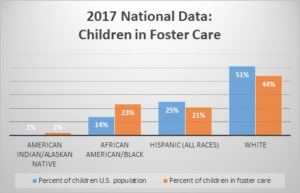In the United States (US), young children ages birth to four are the most racially and ethnically diverse age group. This diversity should mean that policy and practice are particularly focused on serving the needs of this ever-growing, diverse population. Unfortunately, policy has not been responsive to the needs of children and families of color and they are often those who are least well served. This is found across systems that serve families and is particularly prevalent in child welfare systems where African American and American Indian/Alaska Native children are represented at disproportionate rates. Once involved with child welfare, children of color experience disparate treatment and outcomes, such as being less likely to receive family preservation services, experiencing higher rates of removal from their homes, and longer stays in foster care after they have been removed.

Sources: U.S. Department of Health and Human Services, Administration for Children and Families Administration on Children, Youth and Families, Children’s Bureau. Adoption and Foster Care Analysis and Reporting Sytsem (AFCARS) FY2017 data. August 2018. KIDS COUNT data center. Child population by race (2017).
While family-serving systems as a whole have not responded in meaningful ways to address disparity and disproportionality, there are efforts underway in a number of communities to improve outcomes and reduce disparities for children involved with their child welfare systems. Two local examples of efforts to be more responsive to communities of color are the work of the Early Childhood Court Team in Pasco County, Florida, and the Ramsey County, Minnesota, Community Human Services Department’s Anti-Racism Initiative—which is being implemented within their Child Protection Services Division. Both of these efforts are aimed at better serving children and families of color in child welfare systems. They are also both focused on sustaining these changes by grounding their system-change work in equity through:
- establishing a shared commitment to advancing equity;
- engaging the community and increasing transparency;
- using data to inform their work; and
- increasing the capacity of the workforce.
In Pasco County, Florida, the Early Childhood Court Team includes diverse stakeholders from across the child welfare system including: child protection services and ongoing case management staff, community-based service providers, the judiciary, foster parents, and attorneys. As part of their efforts to advance equity within their child welfare system, the team began by establishing a shared commitment to advancing equity. Together, the group identified challenges with practice in engaging families around their identity and race—which consequently, impacted both the quality of data being collected and hindered the ability to have effective strength-based practice with families. To tackle this challenge, the team brought outside experts on race, culture, and ethnicity to conduct a train-the-trainer workshop for the child welfare staff responsible for training child protection and case management workers. Participants were presented with strategies and coached on techniques to engage families on race, ethnicity and culture and how to integrate an understanding of these concepts into ongoing pre-service and in-service trainings. As a result of this training, the Early Childhood Court Team is expecting to see results in improved engagement and subsequent service planning as well as an increased accuracy of data collected on race and ethnicity. Moving forward, the goal of the Early Childhood Court Team is to review and disaggregate their data by race to understand where and when strategies should be implemented to decrease disparities and/or where effective strategies should be scaled to decrease disparities in the broader child welfare system.
Ramsey County, Minnesota’s Child Protection Services Division is working to advance equity in their system through the Anti-Racism Initiative which focuses on engaging both internal system and community stakeholders. With the help of Casey Family Programs, they were able to analyze their data and identified two points of inequity in which to focus: families and children of color are disproportionately screened into their system, and children of color experience disparities in out-of-home placements. As a result of these findings, Ramsey County now uses data to drive policy and program decisions to meet their related goals which includes keeping children out of foster care and in their home when ever safe and possible. The Anti-Racism Initiative is working to establish a commitment to this work across their entire Community Human Services Department. Additionally, central to their work is transparency and accountability and as such, they are working to regularly engage the community through focus groups with community members. Their hope is to solicit feedback from the community regarding new policy and program decisions.
While these examples are not the only such efforts underway across the country, the work in Pasco County, Florida and Ramsey County, Minnesota provide two important examples of how systems are working to create a foundation to advance systemic reforms grounded in equity. As these jurisdictions begin to develop and implement strategies to create a sustained reduction in disparate outcomes—they will face difficult challenges. However, by establishing a shared commitment to advancing equity, engaging the community and increasing transparency, using data to inform their work, and increasing the capacity of the workforce, both Pasco County, Florida and Ramsey County, Minnesota have begun to build a strong foundation for improving outcomes and advancing equity—both now and in their future work.
Meaningful systemic reform can begin at any level of child welfare and local communities and child welfare agencies should not shy away from addressing barriers to equity head-on. For more information on the processes and tools being used in these communities, please watch recent webinars that they hosted—Pasco County and Ramsey County—and see the Race Equity Assessment Tool, being used in Pasco County, Florida.
Alexandra Citrin is a Senior Policy Analyst at CSSP.
Rhiannon A. Reeves is a Policy Analyst at CSSP.
